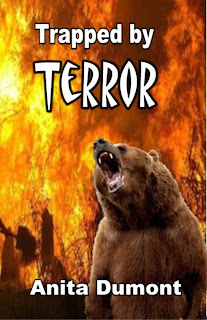A book by an author who knows how to keep in active mode!
Jessie’s parents hope that a new town and a new living experience will help drag her out of the depressed state she had entered. After facing a traumatic event in the city, Jessie lost her confidence and security. They hope that she will begin to feel better about herself by living in the wooded area of BC’s Peace River Region and by learning to take care of animals. But it doesn’t take long for Jessie to realize she doesn’t know much about animals, especially wild ones.
Question from the E-mail:
People in my new writing class keep saying I should write in "active voice" and I'm too embarrassed to tell them I don't know what that means. Can you help, Arline?
Answer: Mea culpa Gwen, if I never taught you that back in the day. Active voice is a term applied to literature meaning that the author keeps the reader completely involved in his prose. Pretty vague, huh?
Mostly it has to do with verb word choices, if you ask me, and you did, Active Voice and Active Verbs are essentially the same thing.
Here's my best advice on verbs and verb tenses.
Verbs are action words, everyone knows that. And it’s a good idea to use the active form of verbs (to stay in active voice) whenever possible. One thing that will instantly make your writing read better is to avoid gerunds and verb participles, by using the active form of the verb. That helps keep you in "active" voice.
Almost all "ing" words follow a "to be" verb–is, was, were, are–one that's in static, if not exactly passive voice. In fact if you search for was, were, etc. you can pick up on those passive phrases and turn them around pretty easily. Instead of "He was still chuckling as he closed the trunk...," try "He chuckled as he closed the trunk." It’s more direct, more specific, more active than the former. Better writing. Do you see what I mean? This is no big thing, but the writing will feel more “participatory” to the reader if you do that.
Some people confuse active voice with present tense, but they are not the same thing.
Some modern fiction is written in present tense, but that is fast going out of style. Once it was the province of the Very Literary and popular in writers’ programs at ivy league schools. But once the likes of Patricia Corneal adapted whole novels into present tense, it quickly went out of fashion as a literary device.
Critics now find it passe and quite a few editors hate it, because they can’t be certain at first glance whether the writer meant to do it, or if he or she doesn’t have a clue about verb tenses. Few editors are patient enough to read far enough to find out. They have a whole stack of manuscripts to get through and the easiest way to clear their desk is to send a printed return letter.
My advice is to only use present tense in narrative only when writing synopses and outlines. By it’s very nature, a story that is written down happened BEFORE it was written down. Therefore the narrative telling the story should be in past tense. Likewise references using the word NOW can be harmful. Now is when the reader is reading the story. It gives me a “time out of place” signal every time I see it. Kind of like seeing old movies with shots of the Twin Towers.
Usually, narrative is written in past tense, dialogue in present tense (because the people are speaking in present time of the story, even if it's historical fiction), and flashbacks are written past perfect tense to distinguish them from the regular past tense of the story's narrative.
For instance (verbs in bold):
Present tense (used in experimental fiction):
I walk toward town. The distant buildings shimmer beneath the summer sun. "This is a hot day!" I say, though there is no one around to hear me.
Past tense, used in most fiction:
I walked toward town. The distant buildings shimmered beneath the summer sun. "This is a hot day!" I said, though there was no one around to hear me.
Past perfect tense, used in flashbacks:
I had been walking toward town. The distant buildings had shimmered beneath the summer sun. "This is a hot day!" I had said, though no one had been around to hear me.


No comments:
Post a Comment